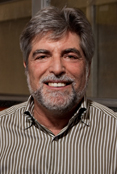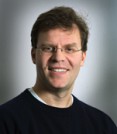Diabetes Center Celebrates 10 Years of Success, Charts Future Course

Jeffrey Bluestone
On September 24 at a daylong scientific symposium in Cole Hall on the UCSF Parnassus campus, the UCSF Diabetes Center celebrated 10 years of scientific accomplishments that are leading to new experimental treatments. The new laboratory research and clinical trials findings described during the symposium by international leaders in diabetes research – including several from UCSF – represent a snapshot in time of research that, year after year, continues to advance scientific understanding and new treatment options. The emphasis on research was apt because it is research that is the foundation for new treatment ideas and new solutions to old problems. “The best science makes for the best clinical care,” said UCSF Chancellor Susan Desmond-Hellmann, MD, MPH, in kicking off the conference. “There is no way to truly understand disease or to make life better for patients without that deep, deep understanding of why things go wrong and – when you try to fix them – why it doesn’t always work out as you would like.” Jeffrey Bluestone, PhD, who was recruited a decade ago to lead and help launch the Diabetes Center, and who now serves as UCSF executive vice chancellor and provost, also took part in kicking off the conference. “Things are changing dramatically – from our care, to our research, to our application of new technology to really understand the basis of the disease and to develop new therapies,” he said.
Research Strengths Include Stem Cells, Transplants, Immunology
UCSF speakers highlighted the Diabetes Center’s research strengths. Mark Anderson, MD, PhD, talked about discoveries regarding the autoimmune nature of type 1 diabetes. His research findings have led him to new ideas for how diabetes might be stopped by coaxing the immune system to accept the pancreatic islet cell proteins that it abnormally attacks in a person with this disease. Michael German, MD, described research leading to a road map for how to create insulin-secreting islet cells from embryonic stem cells, an area in which Diabetes Center researchers are at the forefront.
Video: A Decade of Progress in Diabetes Research
Diabetes Center researchers Allison Xu, PhD, and Suneil Koliwad, MD, PhD, discussed explorations of the biochemical mechanisms through which obesity can contribute to the development of type 2 diabetes and its complications as a result of inflammation, alterations in fat metabolism and perturbations of the normal controls on the actions of the hormones leptin and insulin. UCSF transplant surgeon Peter Stock, MD, cited statistics on the remarkable advances in patient survival for pancreas transplants, combined kidney-pancreas transplants and transplants of pancreatic islet cells – all due in part to improvements in antirejection drug treatments. The Diabetes Center has built and operates the state-of-the-art Human Islet and Cellular Transplantation Facility, and Stock and others have further improved protocols for organ transplantation. Stephen Gitelman, MD, of the Diabetes Center described new clinical trials in which interventions, ranging from modified diets to UCSF-developed treatments targeting the immune system, will be used to try to stop type 1 diabetes from arising in at-risk individuals and to keep islet cells from being destroyed in people newly diagnosed with the disease. Diabetes Center researcher Dean Schillinger, MD, described ethnic differences in diabetes risk and findings on how poverty leads to increased risk for type 2 diabetes and its complications, due to limited affordability of health care, poor management of diabetes and limited access to affordable, healthy food. Schillinger and colleagues are launching a study in which they will establish incentives for buying fruits and vegetables through a food assistance program.
UCSF Diabetes Center: The Next 10 Years
Matthias Hebrok, PhD, who became director of the Diabetes Center earlier year, said during an interview that he believes the pace of research advances in the development of insulin-producing stem cells and other areas will remain impressive over the next decade.

Matthias Hebrok
“I have no doubt that we will get to the point where we will have cells that produce insulin,” Hebrok said. “That’s going to be achievable – probably in less than 10 years.” But it’s also important that these cells be able to adjust insulin secretion normally to achieve healthy glucose control, Hebrok said. “Will we have a cell that’s truly equivalent to a beta cell? I hope so, but until we have it, we don’t have it.” Hebrok said it is also feasible to tailor islet cell transplants to individual patients, using induced pluripotent stem (IPS) cells. IPS cells may be derived from a patient’s own cells. Hebrok is optimistic that it will be possible to coax these cells into becoming working islet cells. It might not be practical to create these cells from every patient for individually tailored therapy, he said. But it may be possible to create a range of cell lines, so that every patient can be transplanted with cells that are immunologically compatible. A drug developed by Bluestone to stop autoimmune attacks on islet cells is destined for more clinical trials, and the results will bear on the feasibility of a variety of transplant approaches, Hebrok said. “A tailored induction of immune tolerance for the cell we put back in would be so much better, compared to just reducing the overall immune response, because we know over time that immunosuppressive drugs increase the chances of getting cancer and opportunistic infections.” Current immunosuppressive drugs given to organ transplant patients also are somewhat toxic to islet cells, and the targeted approach developed by Bluestone, as well as similar strategies being developed by Anderson and Hebrok, should not pose the same toxicity, according to Diabetes Center researchers. The Diabetes Center also has strong research programs on obesity and other challenges related to type 2 diabetes, which is epidemic in the United States and many other nations. “We are continuing our focus on stem cells and immunology, but we also are going to expand our studies on obesity to include the role of inflammation in metabolic diseases,” Hebrok said. “We have done well not only in hiring the best people into the Diabetes Center, but also in retaining them,” he said. “And we are indebted to our donor community for funding endowed chairs. We have gained a bit more room, and through renovation we hope to obtain more space to hire more people. But again, we cannot do this without donor support.”
Related Links:
Diabetes Center Celebrates 10 Years of Research and Care
UCSF Today, September 23, 2010 UCSF Diabetes Center 10th Anniversary (video)
YouTube, September 30, 2010 UCSF Diabetes Center